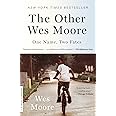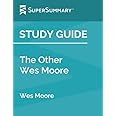
The Other Wes Moore: One Name, Two Fates (One World Essentials) Paperback – January 11, 2011
Description
Full description not available



Reviews
E**A
Wes Moore's Real Message
About five weeks ago, I attended a "Building Leaders" conference in Richmond, where I was able to hear Wes Moore speak about his book and the major lessons he has learned in his lifetime. Wes was one of the most charismatic and intriguing speakers I have ever seen, so it was not surprising that I was simply unable to put his book down. Throughout the entire book, I was consistently engaged in his thought-provoking anecdotes and moving stories of the crime and violence prevalent in inner-city neighborhoods. Most importantly, though, he caused me to step back and re-evaluate the way I view the privileges I have and opportunities I am presented with every day.The way that "The Other Wes Moore" is set up is for the purpose of slowly building up to the final and crucial points he wishes to make, which I will mention later on. He opens up in his introduction discussing the basis for his book: how he came from a poor, rough background living on the streets of Baltimore and the Bronx, but with the support of his mother and others advocating for a brighter future for him, he eventually graduated from Valley Forge military academy, John Hopkins University and graduate school at Oxford University with the prestigious acknowledgement as a Rhodes Scholar and became a second lieutenant in the Army in Afghanistan. In contrast, there was another Wes Moore who similarly grew up not far from where he used to live in Baltimore and lived a troubled teenage life, but ended up getting in deeper trouble and serving a life sentence in prison for robbery and first-degree murder charges. The rest of the book was spent switching back and forth between both Weses, telling stories about their childhoods and the major determining events that led up to their fates--one as a prisoner, and one as a successful journalist, father, and social figure. He ended the book with discussing how to pinpoint where both Weses split in their fork in the road and managed to end up in completely different places--this part is what troubled me the most--and closed with a "Call to Action" section, with lists of organizations and ways to help better the future of our country's youth.Moore's conclusion on what exactly split both Weses' fates was not what the reader wants to hear, and he probably realizes that. He gave a similar answer at both the conference and in his book: that he just doesn't know. At that point, I had to pause and set down my Kindle out of utter shock. How is it that we can't figure out a single driving force that leads to success or failure? And how can we sit back and allow this world of drug, crime, and violence to continue without knowing how to guide it in the right direction? Now, I will give the author this: he breaks down the complex system of the drug activity in cities for us from the runners, hitters, and suppliers, to the game of hiding from parents and "jakes" (police), to the big money and high-profile, violent deals. It becomes obvious how easy it is to get sucked into, and seemingly impossible to get out of. But the author did, so why couldn't the other Wes Moore?Now I won't ruin the book, because it is so worth reading that you need to experience the deep stories and important narratives from reading it first-hand. However, I need to make sure that you realize the true point to his book before delving into it, which I have noticed many other reviews have confused. It is not to tell us exactly how to move the youth towards success, point out the single deciding moment in which both men's paths diverged, or for the author to indulge on his success and scorn the other Wes Moore's decisions/ultimate failure. Instead, Wes Moore longs to make readers thankful for our privileges as Americans, learn to seize onto every opportunity we are presented with and not let one pass by because it could be the biggest improvement of our future, and to highlight ways that we can control ours and others' fates as self-motivators and mentors. Wes talks again and again about mentors, family, and friends he had in life that helped guided him in the right direction. He also notes the way he regained control over his future, instead of letting his low expectations or his environment determine it. As a reader, all you have to do is remember these important themes Wes includes in this book so that you enter with an open mindset and a heart ready to accept a powerful message.
T**S
The Other Wes Moore: An Important Story
"The chilling truth is that Wes's story could have been mine; the tragedy is that my story could have been his."This oft repeated quote from The Other Wes Moore written by Wes Moore sums up the message of his book better than I can.Since its publication I have read numerous articles about The Other Wes Moore, intrigued instantly about this book. Wes Moore, the author, is an accomplished athlete, a Rhodes scholar, a military officer. He grew up in Baltimore, Maryland, in a single parent family after his father's untimely death from a treatable illness. As a troubled youth, his mother's worry escalated to the point that she borrowed money and sent Wes to a prestigious school - away from the influences of their neighborhood. However, Wes found it impossible to fit in and caused trouble there, too. While some might think her next step to be extreme, Joy was so concerned about her son, she sent him away to military school. At first Wes resisted the people in this new environment, wanting nothing more than to return home, but after time passed, Wes was able to see the respect that the men there earned - not from fighting or physical intimidation, but from the way they carried themselves. He was impressed. Wes's mother's intervention probably saved his life.Another young man by the name of Wes Moore was growing up in Baltimore at the same time as the author. The two didn't know each other, but lived oddly comparable lives. Wes was raised by a single mother and had very little contact with his father. He, too, began to cause his mother problems at a young age, and she, like Wes's mother tried to intervene. However, her intervention was not to send her son away to school (and that is not necessarily why Wes's life didn't turn out like the author's), and Wes continued to slip into criminal activities, often under the influence of his older stepbrother, Tony. Wes Moore finds himself in prison, serving a life sentence for the attempted murder of a young police officer who died while trying to stop a burglary, leaving behind his wife and five young children. Tony, Wes's brother was the trigger man in this murder.In adulthood, author Moore becomes aware of Wes Moore and the fact that another young Baltimore man with the same name is wanted for a crime. Eventually, he decides to contact him and the two develop a friendship of sorts, composed of meetings in prison. While the two share a name and background, their paths diverge dramatically after childhood. What caused one man to turn to a life of crime? Why did one man choose to pursue education and a military career? Luck? Chance? Moore does not provide any answers, and there is no way anyone can decide why certain things happen in life. However, as Moore states in his book (and I have restated above):"The chilling truth is that Wes's story could have been mine; the tragedy is that my story could have been his."This book is hard to put down. While I knew from the outset that Moore would be arrested and in prison for life, it is still tragic to see his life unfold, knowing that he will make decision that will be disastrous to him later on. Author Moore is also very quick to share that the true victim in this book is not Wes Moore, but rather, Officer Prothero who was killed at the age of thirty five, leaving his children to grow up without a father. This book reads much like a story, but it provides a lot to think about as well, as we look at urban neighborhoods that are impoverished and lack male role models.And finally, this book ends with a call to action by Tavis Smiley:"Fundamentally, this story is about two boys, each of whom was going through his own personal journey and searching for help. One of them received it; the other didn't. And now the world stands witness to the results. Small interactions and effortless acts of kindness can mean the difference between failure and success, pain and pleasure- or becoming the people we loathe or love to become. We are more powerful than we realize, and I urge you to internalize the meaning of this remarkable story and unleash your own power."
Common Questions
Trustpilot
1 day ago
1 month ago



